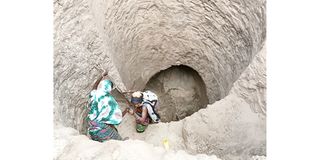Relief for water-starved residents as borehole drilling starts

A woman helps her friend out of a deep well while fetching water in Assa village in Tana River County
For many decades, most parts of Tana River County have grappled with water scarcity that prompted people to migrate from their homes in search of the commodity.
Findings by the Kenya Water and Sanitation Civil Society network indicate that of the county’s population of 340,000, some 200,000 have no access to fresh water.
The most affected are herder communities, who must walk more than 30km to find water for domestic use.
Without rain, learning in some areas is affected and students drop out of school to help their parents fetch water.
In Lakole village, residents survive by digging deep boreholes.
"This has been our life. If it does not rain, the water pan dries up and we have to resort to this cycle to survive,” says Ibrahim Kuno.
Yasmin Hanti, a mother of six, notes that none of her children are in school as they have to join in the search for water.
She notes that adults prefer to send children into the wells to fetch water as the loose soil cannot hold the weight of grown-ups.
The experience traumatises residents every dry season.
But this is set to end as county officials seek to pump Sh250 million into expanding water supply to the hinterland and areas affected by drought.
County Water Director Felix Mumba said the administration had kicked off the drilling of more than 10 freshwater boreholes in various villages that have suffered water scarcity for decades.
"These are areas that have depended on rain, and when there is no rain, they dig shallow wells that (sometimes) collapse and bury their people," he said.
Officials want to create a solar-powered water system, with residents only responsible for providing security to the solar panels.
The projects have so far kicked off in Gururi and Lakole villages, where the administration has dug 180-metre and 145-metre boreholes respectively.
The water will be sent by pipe to designated tanks in the villages for residents to share.
Other areas targeted for drilling include Hakoka, Rhoka, Dafoma, Laini, Bohoni, Ghalamani, Wachakone, Kajificheni, Lenda, Handampia, Bondeni and Vukoni. More than 60,000 residents are expected to benefit.
“All these areas are experiencing a similar problem. Some are near the river but we are inspired to drill boreholes to avert the rising rate of crocodile attacks on the river banks,” he says.
Mr Mumba also notes that the administration has partnered with the Small-Scale Irrigation and Value Addition Project (Sivap) that brings in Sh150 million to be used in drilling 27 more boreholes and water retention basins.
The construction of large-volume water retention basins in various areas targets villages with high populations of livestock in Galole and Bura constituencies.
This, he says, will inspire the production of food and fodder and thus reduce migration and starvation.
“We are dealing with water pans that range between 200,000 and 300,000 cubic litres of water, so that when it rains and when they fill up they can sustain residents for more than a year,” he says.
Officials want to finalise the drilling of 10 boreholes by April 2022 and proceed with fresh mapping of other areas experiencing mild water scarcity.
Tana Water and Sewerage Company (Tawasco) has also hinted it will start more water projects in other key areas of the county.
Managing Director William Jilo says that through Coast Water Services the government is drilling wells and equipping them with solar power for pumping.
“We want to ensure that residents don't walk long distances for water. It is an exercise bypassed by time,” he said.
However, he appeals to residents in villages that have not been reached with the water project to be patient as water surveyors try to find areas with the potential to yield fresh water.
Meanwhile, herder communities have lauded the projects, terming them a perfect jab for the water problems in the county.
They have appealed to the county government to prioritise the most affected areas as a quick intervention measure.
“We never imagined a day when we would have fresh water in our village. We are very grateful and hope a day will come when we will have water in our houses like people in towns,'' Mr Ali Roba said.





